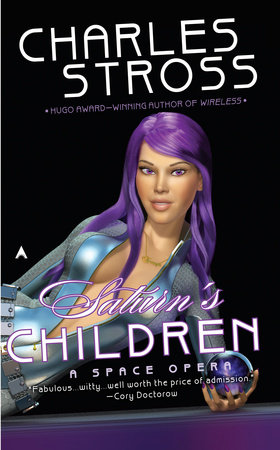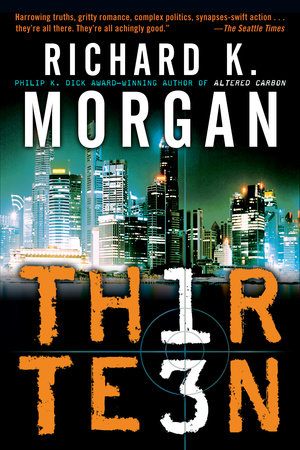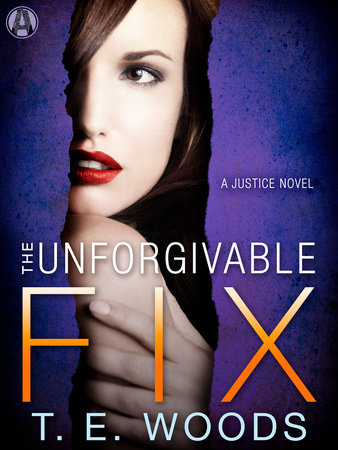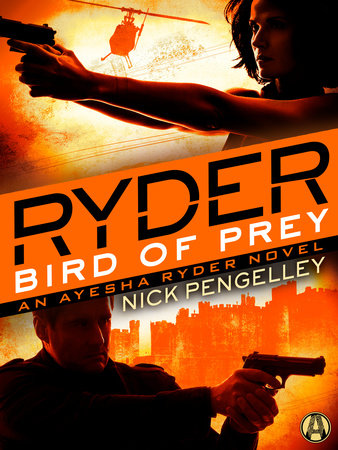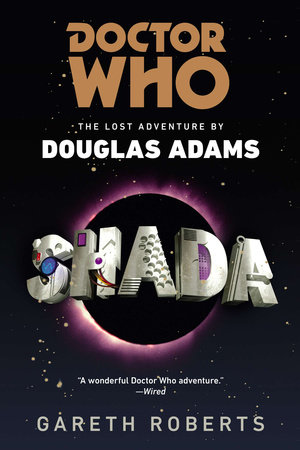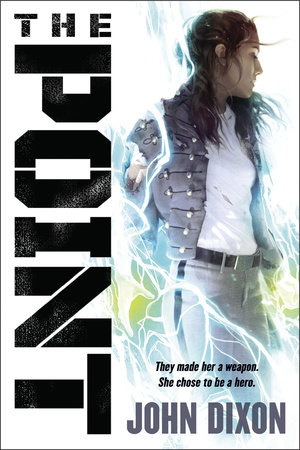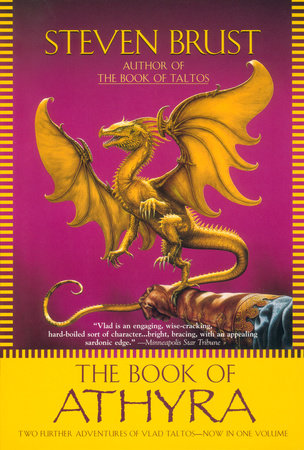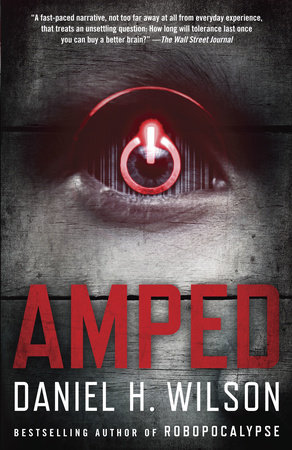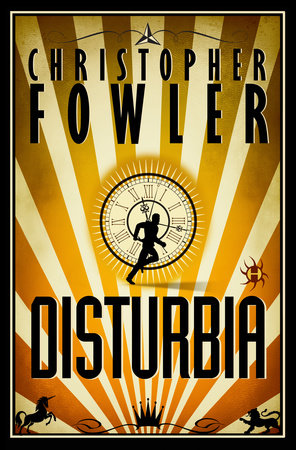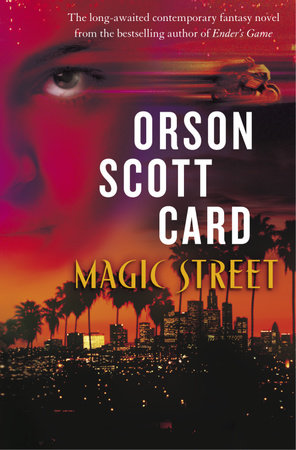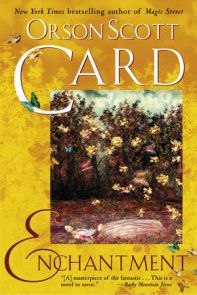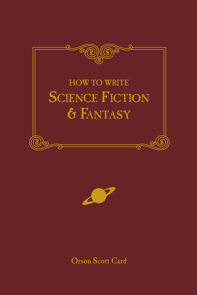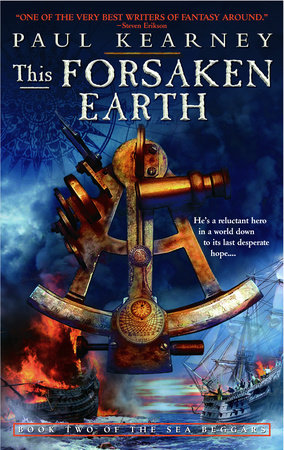Author Q&A
Interview With Orson Scott Card
Question:Just to get this question out of the way, some people are going to ask what gives you, a white male, the insight and experience to write about African-American characters in a black community. Your response?
Orson Scott Card:I only have the insight and experience to write about human beings in human communities. The specifics of this community and these human beings were greatly helped by the friends I acknowledge in the book – as well as a lifetime of living in an America deeply penetrated and influenced by many aspects of different African-American communities.
In a sense, all attempts to depict individuals who are unlike the author and who live in communities the author does not live in are doomed to failure. You can’t help but get something wrong. All you can ever do is treat the communities and characters you write about with enough respect that you’ll try to learn and get things right.
Q:Where did you get the idea for Magic Street? Why couldn’t the story have been told with white characters, or characters of any other race? In other words, what is it about this story that is specifically black, that demanded to be told in this way and no other?
OSC:The original idea was from my friend, Roland Bernard Brown, who wrote to me (from LA, where he lives), asking me to write a black male hero who would be as strong a figure as the white male and female heroes I had already written. I told him then that while I was confident of my ability to write a hero of either sex or of any age, the decision to set a story within an existing community was a guarantee of failure – unless I had help. He agreed to help, so I began a long process of coming up with an effective story.
Since the premise was to create a contemporary black male hero, I could hardly tell the same story with white characters.
The more Roland talked to me about upper-middle-class life as a black living in both black and integrated society in LA, the more determined I became that this story was not going to be about race – that is, about relations between whites and blacks in LA. Too many ugly things happened in the intervening years – like the Rodney King incident, and the riots after the trial, and the O.J. thing, all of which made me less and less interested in writing a fiction about black-and-white.
What I wanted was for my hero to be a black man who nevertheless was saving the world (in the generic sense). I wanted to focus on him within the neighborhood he grew up in, the people that he knew well, and not his prickly and dangerous relations with “the man.” Besides, Walter Mosley was already writing his Easy Rawlins books, which did everything I could possibly have hoped to do with racial interaction in LA – and far better than I could have done it. (Being members of the minority, blacks are, by experience, experts on black and white culture; few whites have enough opportunities to interact with large numbers of blacks to be able to know black society half so well as blacks in America have to know white society in order to survive!)
Driving around Baldwin Hills; meeting with Queen Latifah about another project; conversations with African-American friends here in Greensboro and elsewhere; reading books by black writers about black culture – all these things contributed to the growing story. Ultimately, though, it was a story that came out of my own imagination and experience of human life; what else do I have to rely on?
Q: Wait, so there really is a Baldwin Hills, California?
OSC:Take the La Cienega exit from the 10 and drive south.
Q:And wait again: you’re working on a project with Queen Latifah?
OSC: I can’t say any more about that right now. Sorry.
Q:Okay, back to Magic Street. What steps did you take to avoid stumbling into stereotype?
OSC:It’s easy to avoid stereotype, simply by never writing characters as if they were “minor.” I try to treat every character who is more than a place holder as the hero of his or her own story. They don’t act as the story needs them to; they act as they would act in order to accomplish their own purposes or respond to their own needs.
But I don’t get fanatical about avoiding stereotypes. It’s like a black comedian once said (sorry, can’t remember who, just heard it on XM radio): “I like watermelon. And now I can’t eat it in public because it reinforces a stereotype.”
Of course, the decision to set the story in Baldwin Hills rather than the mean streets was a deliberate one. I was not showing the movie cliche of black life, I was showing the lives of the greater number of American blacks who live in decent, comfortable, safe neighborhoods and go to regular jobs and live by the rules of their Christian faith or ordinary American ethics. Not dealing or taking drugs, not facing violence every day. By not going into that territory (except in a few brief incidents), I steered away from some of the worst cliches in American writing today.
Q:Is it possible for a white man to write a novel about black characters in America without having these sorts of questions asked and issues raised? Will there ever be a racially neutral literature and readership? Is that even desirable?
OSC: Let me give you a different example. I direct plays in Greensboro, a southern town. Since it’s amateur theatre, I try hard to cast everyone who tries out. There are aspects of people’s physical appearance that you have to take into account. Male or female, tall or short, old or young – these things play a part in casting, there’s simply no avoiding it, because the audience needs help in envisioning the characters.
But they don’t need to be sorted out by race. I did my script of “A Dixie Christmas Carol,” and one of the Cratchits was played by a mixed-race, black-looking kid. I didn’t adapt the script. I didn’t explain. There was no need. The audience got it immediately and forgot about it. Saw the same thing in one of the casts of Les Miz in New York: Madame Thenardier was played, for a while, by a black actress. No explanation, no apology. The audience was fine – and there was no attempt to do “white make-up.”
Now, this won’t work when the play is about race. You can’t cast Big River with a white Jim and a black Huck, because the audience would be bothered and distracted by the casting throughout the play. (Which breaks my heart. There was a time when I could so have sung the part of Jim, but it would never, never happen!)
Most of the time, though, you can do race-neutral casting, and audiences in the north and south do fine with it.
But it’s not everybody – it’s just the play-going public. The people most likely to be bothered by it won’t be there to see it anyway, because they don’t go to plays.
It’s the same way with books. Most people who read books regularly are sophisticated enough to know that if the book feels real, it doesn’t matter what race the writer is. After all, we read historical novels by people who never lived in the eras they describe. We read books with male and female characters by authors who inevitably belong to only one of those sexes.
It’s not for any literary reason that this question is going to come up. It’s only because of politics in America today. And it will take time for race to stop being a political matter. But a book like Magic Street will, I hope, be part of the gradual erosion of that wall. Not because the book is particularly egalitarian – it’s not about that sort of thing, not about politics at all. Rather, I hope the book will help precisely because if I did a good job, then black readers will get the pleasant surprise of realizing that a white writer can get it partly or mostly right; and white readers will get an exposure to a version of black culture they probably haven’t seen before. On both sides, some walls get smaller. Maybe.
Or maybe not, and we’ll go a few months or years till somebody else does a better job than I did.
Q:Magic Street could just as easily have been called Mack Street, after its central character. Tell us about him.
OSC:I named him Mack Street because of the title. He’s a kid who was found in a field and raised by a single (formerly married) nurse, with the help of the neighbor boy who found him. He wanders the streets of his neighborhood, seeing everything and everybody through different eyes, because for some reason he sees their dreams at night. He knows his neighbors by their dreams, which reveal their deepest hopes and fears. He also knows that sometimes those dreams come true in terrible ways, and that in some twisted way it’s partly his fault when they do. He takes that seriously, and tries to prevent it. Ultimately, though, it’s tied in to who he really is, which is the central mystery of the novel.
Q:You’ve drawn a lot of the fairy lore permeating Magic Street from the works of Shakespeare, especially A Midsummer Night’s Dream and The Tempest. What other sources did you use?
OSC:Those weren’t so much the sources of the magic as a game I started playing partway through writing the novel. When I realized that some of these characters were Shakespearean at root, then it became more fun – almost exhilarating sometimes – to twist them into and through the story.
Ultimately, though, the “source” is my own sense of how human beings exercise power in each other’s lives. Magic in fantasy fiction is invariably a reflection of that.
Q:If Mack Street is the novel’s central character, who is its moral compass? Ceese Tucker? Word Williams?
OSC:There’s no moral compass. Each character has his or her own morality, and they all differ slightly from each other. That’s how the world works – we’re all playing at the same table, but by slightly different rules. And sometimes not so slightly.
Ultimately, of course, the moral compass is me. I’m the one who chooses what happens and why. But within my stories, there is never a character who is always right or who speaks for me with any kind of reliability.
Q: You’re known to most readers as a science fiction author, and so perhaps it’s not too surprising that the magical system you develop in Magic Street has a kind of plausible scientific basis, on the level of quantum physics. Is there room in the physical laws of the universe for magic and the supernatural?
OSC:Nope.
Q:Just to shift gears, what can you tell us about the forthcoming Ender’s Game movie?
OSC:We’re still working on developing the right script. My screenplay isn’t terribly faithful to the details of the story, but perfectly faithful to the spirit and meaning of the story. But when you have a film that’s going to cost a hundred million to do it properly, you don’t bet it all on an author-written screenplay! Right now David Benioff (Troy) and his writing partner, D.B. Weiss, are working on it, and I have high hopes, because I think Troy was a brilliant adaptation of an impossible-to-adapt story. I’ve heard from people who are irate at what Benioff left out of Troy, but my feeling is, the movie didn’t erase The Iliad, it merely introduced it to a huge audience and brought the visual power of the story to people who had never seen it. The visualization of Achilles was incredibly well done, and I think it is Brad Pitt’s greatest performance.
Okay, the movie Ender’s Game is going to leave things out. So what? It won’t erase the book. If anything, it will draw people to the novel. What I want is for EG to be a great movie first, and an adaptation of my novel only second.
Q:Some readers may have been surprised a minute ago when you mentioned your work as a director and playwright. Were you always interested in writing for the theater?
OSC:“Always” is a tough concept. Let’s just say that I grew up Mormon, which means I was writing my own talks to give in church from the age of six on. Mormons also have – or at least had – a rich theatrical tradition. Every year when I was growing up we put on fifteen-minute comedies we called “road shows,” which were written by ordinary members of the church – including my parents. It’s not quite the same as being “born in a trunk,” but it’s close – theatre was something that I thought of as a perfectly natural part of life, and scripts were things that anybody could write.
So when I got to college and realized I was spending all my time working on plays, I quit majoring in archaeology and switched to theatre. I’m a good director, but I found that I was most appreciated as a playwright, doctoring other people’s scripts and writing my own. So I kept it up. That’s how I became a writer. When people line up for hours to get into a show you wrote, you begin to think, OK, maybe I can do this.
Q:Have you adapted any of your novels into plays?
OSC:No. I also learned that you can lose money even with a hit play. I’m supporting a family here, so I write novels. The plays I write now are all original, and all for a specific purpose.
However, I recently directed a production in LA called Posing As People. It was three one-act plays adapted from stories of mine, by three different playwrights who expected to play the lead in their own play. It was wonderful to see what they did to the stories, how they expanded them and turned them into highly theatrical pieces.
But the play version of my science fiction novels? It is to laugh. Most of my stuff wouldn’t even adapt to film; stage would be even harder.
Of course, having said that, I do think Sarah and Rebekah and Rachel & Leah – my Women of Genesis novels – would do very well. (No special effects.) And my novel Stone Tables was based on my musical play of the same name (with composer Robert Stoddard) – but that’s going the other direction. I’m also adapting some of my short stories into plays – “Feed the Baby of Love” and “Pageant Wagon” as musicals, as a matter of fact.
Q:Science fiction rules the Hollywood box office. Why can’t it conquer Broadway? Is there something inherently untheatrical about science fiction?
OSC:Before movies learned to talk, plays could compete for visual reality and spectacle. Now they can’t. And science fiction, as conceived by Hollywood – basically, print sci-fi of the 1930s – is hugely about the spectacle. Nothing you can do on stage can compare with CGI on the screen.
But that doesn’t mean it can’t be done. It’s just a different kind of science fiction that you’d use to go to stage. There is a huge tradition of character-based science fiction that would work very well on stage. Most Twilight Zone episodes were really in this category – after all, Serling was a playwright at heart, wasn’t he? And the science fictional elements in Posing As People did not require elaborate sets or costumes.
It comes together in the works of Charlie Kaufman. Being John Malkovich and Eternal Sunshine of the Spotless Mind were, quite simply, the first truly great science fiction movies, ever. These two movies could easily work on stage, and probably should. I could see them both as musicals, actually, and if I only had professional credibility, I’d be approaching Kaufman and/or the studios right now to try to get the rights to adapt them as musical dramas.
Q:Do you have any plans to return to the world of Magic Street?
OSC:Nope.
Q:What other projects are you working on now?
OSC: It’s an endless list. I’m going to start teaching writing as a professor at Southern Virginia University in Buena Vista, VA, this fall. I have a bunch of novels in progress, at various stages. I’m working on the musical of “Feed the Baby of Love.” I’m writing Ultimate Iron Man for Marvel. I’ve got screenplays, by me and others, that I’m working with my production company to get funded and filmed. Some of these things I might even get paid for!



